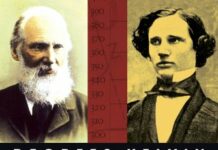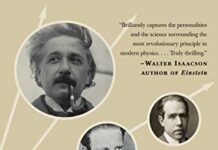
Ebook Info
- Published: 2015
- Number of pages: 274 pages
- Format: PDF
- File Size: 31.00 MB
- Authors: David Lindley
Description
In 1900 many eminent scientists did not believe atoms existed, yet within just a few years the atomic century launched into history with an astonishing string of breakthroughs in physics that began with Albert Einstein and continues to this day. Before this explosive growth into the modern age took place, an all-but-forgotten genius strove for forty years to win acceptance for the atomic theory of matter and an altogether new way of doing physics. Ludwig Boltz-mann battled with philosophers, the scientific establishment, and his own potent demons. His victory led the way to the greatest scientific achievements of the twentieth century. Now acclaimed science writer David Lindley portrays the dramatic story of Boltzmann and his embrace of the atom, while providing a window on the civilized world that gave birth to our scientific era. Boltzmann emerges as an endearingly quixotic character, passionately inspired by Beethoven, who muddled through the practical matters of life in a European gilded age. Boltzmann’s story reaches from fin de siècle Vienna, across Germany and Britain, to America. As the Habsburg Empire was crumbling, Germany’s intellectual might was growing; Edinburgh in Scotland was one of the most intellectually fertile places on earth; and, in America, brilliant independent minds were beginning to draw on the best ideas of the bureaucratized old world. Boltzmann’s nemesis in the field of theoretical physics at home in Austria was Ernst Mach, noted today in the term Mach I, the speed of sound. Mach believed physics should address only that which could be directly observed. How could we know that frisky atoms jiggling about corresponded to heat if we couldn’t see them? Why should we bother with theories that only told us what would probably happen, rather than making an absolute prediction? Mach and Boltzmann both believed in the power of science, but their approaches to physics could not have been more opposed. Boltzmann sought to explain the real world, and cast aside any philosophical criteria. Mach, along with many nineteenth-century scientists, wanted to construct an empirical edifice of absolute truths that obeyed strict philosophical rules. Boltzmann did not get on well with authority in any form, and he did his best work at arm’s length from it. When at the end of his career he engaged with the philosophical authorities in the Viennese academy, the results were personally disastrous and tragic. Yet Boltzmann’s enduring legacy lives on in the new physics and technology of our wired world. Lindley’s elegant telling of this tale combines the detailed breadth of the best history, the beauty of theoretical physics, and the psychological insight belonging to the finest of novels.
User’s Reviews
Reviews from Amazon users which were colected at the time this book was published on the website:
⭐Today we have little problem understanding that certain laws of physics are probabilistic. Statistical probabilities are an integral part of trying to understand the behavior of atoms. But in the late 1800’s suggesting that we understand nature by statistics was anathema to most physicists. Nature had “laws” and those laws were either true or not true. If they were statistical probabilities they were not “laws.” It was Ludwig Boltzmann who revolutionized the way we think of atoms by showing, for example, that in the second law of thermodynamics the increase of entropy at any given moment in time is a very high probability but never an absolute certainty. It is not impossible that heat could flow to a hotter body; it is just enormously unlikely. This change in thinking about the way we understand nature led to so much more after Boltzmann’s death. He spent much of his life repeating his point again and again. Plagued by bad health, long periods of apathy and depression that he called “neurasthenia,” and a frequent sense that his work was not appreciated, Boltzmann committed suicide at age 62. Largely unknown to him, his work opened the door to a new way of understanding the very small in nature – a critical part of the foundation of physics.David Lindley is a fine writer and his descriptions of Boltzmann’s life and work are clear and easy to follow. My only problem with the book is with the digressions. Lindley also wrote the superb biography of Lord Kelvin published three years after this book. In the Kelvin biography he also digresses and talks for several pages about people that Kelvin worked with. I found those discussions interesting, relevant and well-written. But I did not feel that way about some of the digressions in this book. Lindley’s discussions of other historical figures are less directly relevant here at times. For example, he spends much of the second chapter talking about the atomic theories of Lucretius and Democritus. The idea is to give a thumbnail sketch of the history of atomic theory but to this reader it was much more than I wanted to know in a book about the life of Boltzmann. His dozen page discussion of the background, life and work of the American Josiah Gibbs is much more directly relevant to Boltzmann’s work but seemed to include more than was necessary. Other digressions like the ones on Helmholtz and Maxwell I thought were better tied to the overall context. But this is really a minor problem. Perhaps it is because his book on Kelvin is so consistently strong that my disappointment rises because I am comparing Lindley’s work here against his own later book. In any case this work stands by itself as a worthwhile book on both Boltzmann and the state of physics in the late 1800’s.Ludwig Boltzmann is not a household word, even among those with some background in science. But his place in the history of physics is critical in the development of the modern scientific worldview. Lindley’s book gives Boltzmann his due and fleshes out the life of a brilliant but often tortured person. I recommend the book.
⭐The title of my review is an expression of disappointment. I was expecting deeper explanations and discussion of Boltzmann’s game changing approach to physics, but what this fine treatment offers is a narrative history of Boltzmann’s work and life. Lindley provides a fine sketch of the intellectual climate of physics in mid nineteenth century Vienna, Graz, Munich, and Cambridge. His discussion of Loschmidt and Mach is very good– especially Mach. And he manages to capture the taciturn Gibbs in an off-handed way. But Lindley is no biographer. He is writing a research review narrative that is neither biography nor intellectual history, but rather a kind of graduate students’ table talk of thermodynamics. I turned to Boltzmann’s Lectures of Gas Theory for the math and was delighted. This book is fine when taken on its own modest terms and goals: to tell the reader about how physicists in the nineteenth century thought about and argued over heat. It is a worthwhile “quick and dirty” history those arguments.
⭐My interest in Boltzmann was piqued from a friend who has a mutual fascination with the foundation of 20th century physics. I also had experience in a Statistical Mechanics class in graduate school that included derivation of Boltzmann’s constant from basic considerations of atoms as independent particles with a distribution of energies.The book conveys the unsettled state of affairs for physics in the last half of the 19th century. Atomic theory was not universally accepted. James Clerk Maxwell’s theories on electromagnetism were beginning to be appreciated. Josiah Willard Gibbs’ treatment of thermodynamics was in progress. But some leaders, especially Ernst Mach, staunchly advocated for physics being a discipline completely reliant on observable phenomenon. Theoretical treatments like Boltzmann’s belonged in philosophy! Compounding the confusion was academic vanity and nationalism. Austria, Germany, England were all interested in supporting physics based on their native sons as much as physics that actually accounted for reality. Finally thrown into this mess were inconvenient measurements like black body radiation, which eventually led Max Planck to hypothesize that energy is quantized.Boltzmann is in the midst of it all, and it apparently exacted a toll on his psyche. Though the accounting of Boltzmann’s accomplishments and movements is thorough, I was stunned and unprepared to read of his death by suicide. The three stars rating of the book relates to the failure of the book to prepare me.
⭐From mans evolving suspicion to full scientific acceptance which birthed relativity and quantum theory.
⭐As a college professor who has taught thermal physics to undergrads several times, I could not put this book down. It was incredibly interesting to learn in more detail the intellectual debates that occurred during the development of equilibrium statistical physics in the later years of the 19th century. David Lindley is a clear expositor and offers many insights into the changes in the process and approach to science that this period produced, especially the introduction of statistical thinking into physics, and the willingness to accept and theorize about unseen things (e.g atoms) which led to the full development of modern theoretical physics. The book also sets these scientific developments in the historical context of the time, illustrating the role that politics played in shaping the science. Although Botzmann’s life had elements of frustration and sadness in it, and came to a tragic end, his life and this book are inspiring as well as captivating. Highly recommended!
⭐Very well researched and written. Right mix of biography, history and physics. Recommended to anyone interested in the history of atomism.
Keywords
Free Download Boltzmanns Atom: The Great Debate That Launched A Revolution In Physics in PDF format
Boltzmanns Atom: The Great Debate That Launched A Revolution In Physics PDF Free Download
Download Boltzmanns Atom: The Great Debate That Launched A Revolution In Physics 2015 PDF Free
Boltzmanns Atom: The Great Debate That Launched A Revolution In Physics 2015 PDF Free Download
Download Boltzmanns Atom: The Great Debate That Launched A Revolution In Physics PDF
Free Download Ebook Boltzmanns Atom: The Great Debate That Launched A Revolution In Physics


